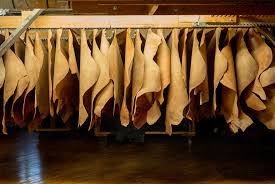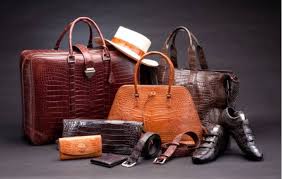![]()
If you’ve landed on this article page, you’re probably searching for a
good business idea—an idea that’s light on the pocket but heavy on
returns, promising both a fulfilling journey and potential profit.
|
How To Start A Lucrative Leather
Production Business In Nigeria
The leather production business involves transforming raw hides
and skins into finished leather products such as shoes, bags,
belts, and jackets.
Leather production is a significant economic activity that holds
great potential for Nigeria. Nigeria is blessed with abundant
livestock resources, making it an ideal location for leather
production. The leather industry is a crucial sector that
provides numerous opportunities for entrepreneurs and investors
to participate in the production of high-quality leather
products for local consumption and export.
The rising demand for high-quality leather products from the
fashion, automotive, and furniture industries presents a
significant opportunity for African countries like Nigeria to
increase their leather exports.
The government’s recent efforts to promote local leather
production and improve the leather value chain through
initiatives like the Leather Sector Development Project (LSDP)
are expected to boost the sector’s growth and increase export
opportunities for Nigerian leather products.
In Nigeria and Africa, there are various types of leather used
for the production of leather goods, including:
Cowhide: This is the most commonly used type of leather in
Nigeria and Africa due to its widespread availability and
durability.
Goat and Sheepskin: These types of leather are softer and more
pliable, making them ideal for the production of items such as
gloves and jackets.
Crocodile and Snake Skin: These exotic leathers are more
expensive and used in high-end fashion items such as handbags,
shoes, and belts.
Fish Leather: This unique type of leather is produced from fish
skin and is becoming increasingly popular for its durability and
eco-friendliness.
Ostrich Leather: This is a luxurious and durable leather that is
commonly used in the production of high-end shoes, handbags, and
wallets.
Pigskin: This is a soft and pliable leather commonly used in the
production of clothing and footwear.
Horsehide: This is a strong and durable leather used in the
production of items such as jackets, bags, and belts.
Deer and Elk Skin: These types of leather are soft and supple,
making them ideal for the production of gloves and jackets.
Buffalo Hide: This is a thick and durable leather used in the
production of items such as belts and saddles.
The choice of leather type used for leather production depends
on the final product’s intended use, as well as factors such as
durability, flexibility, and aesthetic appeal.
Leather production in Nigeria and Africa is a year-round
business, but there are certain seasons that experience peak
production and demand. Generally, peak production season for the
Leather industry in Nigeria and Africa is between the months of
November to March, which coincide with the dry season in most
parts of the continent. During this period, the weather is ideal
for the production of leather, as the dry weather conditions
help to prevent the growth of bacteria, which can negatively
impact the quality of the leather.
Processing and packaging leather is an essential aspect of the
leather production business in Nigeria .They are
Sorting and grading: After obtaining the rawhide, sort it to
remove the unwanted parts and grade it based on quality.
Soaking: Soak the hide in water to remove dirt and other
impurities.
Liming: Treat the hide with lime or other chemicals to remove
hair, flesh, and epidermis.
Fleshing: Use a fleshing machine or knife to remove excess flesh
from the hide.
Tanning: Tanning can be done through different methods such as
vegetable tanning, chrome tanning, and synthetic tanning.
Drying: After tanning, the leather is dried to remove excess
moisture.
Finishing: The leather is trimmed, buffed, and dyed to give it a
desired finish.
Cutting and stitching: The leather is then cut and stitched into
various products such as shoes, bags, and belts.
Packaging: Pack the leather in suitable materials such as
cardboard or plastic.
Proper packaging and labeling are essential to protect the
leather from damage and ensure that it is transported safely to
the buyer.
To process, package and supply leather in Nigeria and Africa,
the following equipment are commonly used:
Tanning drums: These are large drums used to soak the hides in
chemicals to remove the hair and preserve the leather.
Fleshing machines: These are used to remove excess flesh from
the hides before tanning.
Splitting machines: These are used to split the hides into
thinner layers, depending on the desired thickness of the
leather.
Leather skiving machines: These are used to shave the edges of
the leather to a desired thickness and shape.
Leather embossing machines: These are used to create patterns
and designs on the leather.
Leather sewing machines: These are used to stitch together
leather pieces to create finished products.
Leather finishing machines: These are used to add final touches
and finishes to the leather, such as polishing or adding
protective coatings.
Packaging equipment: This includes tools for cutting, shaping,
and sealing leather products into their final packaging.
Footwear Industry: The footwear industry is a significant
consumer of leather products. Shoes, boots, sandals, and other
types of footwear are produced using leather as the primary raw
material. The demand for leather from this industry is high,
especially during the peak season when production increases.
Furniture Industry: The furniture industry uses leather for
producing chairs, sofas, tables, and other types of furniture.
Leather provides a luxurious and durable finish to furniture,
making it a popular material for high-end furniture.
Fashion Industry: The fashion industry is another major consumer
of leather products. Leather jackets, handbags, belts, and other
fashion accessories are in high demand. The fashion industry
requires a constant supply of high-quality leather.
Automotive Industry: The automotive industry uses leather for
car seats, steering wheels, gear knobs, and other interior
components. The demand for leather from this industry is
increasing, especially in the luxury car segment.
Upholstery Industry: The upholstery industry uses leather for
producing leather seats, covers, and other decorative items. The
demand for leather from this industry is increasing due to the
popularity of leather in home decor.
Sports Equipment Industry: The sports equipment industry uses
leather for producing sports balls, gloves, and other equipment.
The demand for leather from this industry is steady, especially
for premium sports equipment.
Get our training guide on Leather Production Business in Nigeria. Our Complete guide was carried out with a comprehensive studies backed up with effective marketing strategies. The machines and equipment are locally available and details information will be given to prospective investors. We provide you with a quick-start solution, complete hands-on training and support! It is an affordable opportunity for everyone who wants a fast return of investment! Proven to generate income right away!
|







